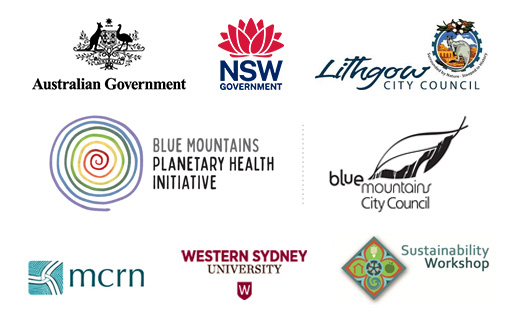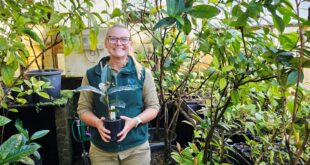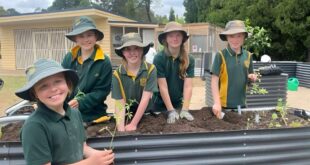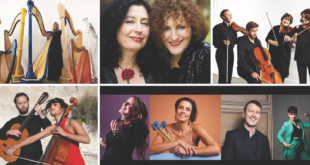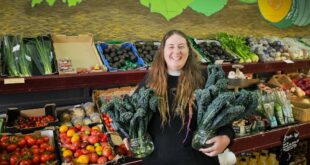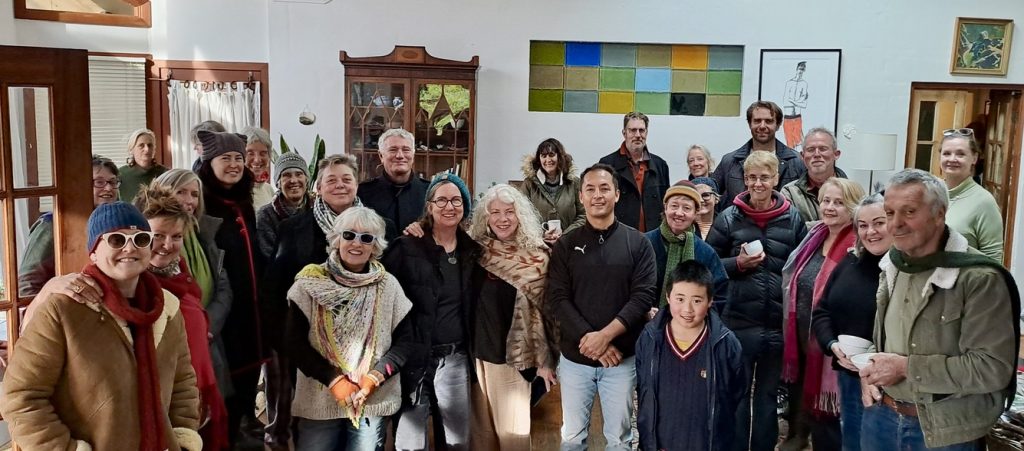
Anna Ingham, Lisa Hicks and Esmat Noori (centre). (Hamish Dunlop)
By Hamish Dunlop
Afghan refugee Esmat Noori cooks for members of the Blue Mountains community at a fundraising lunch in Blackheath. The event was organised to support a group of young women in Afghanistan studying to be nurses under the Taliban regime.
Esmat Noori was born into war. He grew up in tough times where bombs, bullets and beatings were commonplace. When the Taliban arrived, terror and public executions followed. Esmat was working in a bar at the British Embassy in Kabul. Consuming or selling alcohol was outlawed under the regime. One day the Taliban came to his house. They beat his mother and promised to return and kill him.
The scene at Bower Cottage in Blackheath could not be more different. It is a house filled with life and culture. A glowing wood burner warms the high-ceilinged room. Hanging on the walls are artworks painted with muted oils and bright acrylics. Bronze and wooden sculptures demarcate space with organic and geometric forms. There are abundant signs of everyday life: stacks of locally made pottery on wooden shelves, jars of pickles, farm eggs in a worn carton and a bowl of bright orange mandarins.

Mandarins and home preserved olives. (Hamish Dunlop)
I am warmly greeted by host Anna Ingham. She and Esmat came up with the idea of the fundraising lunches. The money goes to support a group of Afghan women studying to be nurses in Kabul. Following the Taliban takeover in 2021, nursing became the only vocation women could pursue. Still, the ban on women traveling without a familial male meant it was difficult for the women to get to class. The money from these lunches pays for a minibus to ferry them between home and university.
Anna tells me this is the sixth or seventh lunch. People come together to eat, talk and learn about Afghan culture. At a previous event, Esmat showed slides of Afghanistan’s past. It hasn’t always been a place of guns and oppressive politics. He connected with the group of nursing students through family connections in Kabul. The group’s leader is a social activist and ex-film studies student. In the past, the lunch group Zoom-called her on a large TV screen. She got to meet her supporters and the guests got to witness the reality of Afghanistan under Taliban rule.

A trio of women in Kabul in the 1970s prior to the 1979 Russian invasion.
By 1pm the trickle of people arriving at Bower Cottage has turned into a stream. Everyone is layered up because most of the lunch tables are on the deck. A musical duo from Wollongong play rousing European folk songs. People join the singing and two people play spoons to liven up the beat. Laughter is in the air and good will fashions all the spaces in the house. There are spirited conversations and quieter moments, where words are woven around the scent of Afghan cuisine about to be served.

Baloni. (Hamish Dunlop)
The feast that Esmat and his mother have prepared is spectacular. There are rich meat and split pea curries, golden-red with turmeric and other spices. Glass bowls of crisp lettuce adorn every table. Fried potato and chive-filled pastries called Beloni are served as finger food. Firni is served for dessert. It’s made with milk, corn flour and sugar stirred over hours. It’s scented with cardamom and Esmat criss-crosses it with lines of crushed pistachios. Fresh strawberries, blackberries and blueberries are spread liberally over the top.

Esmat putting the final touches on lunch, with his mum supervising. (Hamish Dunlop)
Esmat tells me you can make the firni in 30 minutes, but it’s just doesn’t taste as good. He loves cooking for people. But there’s something deeper about the way he engages with creating food. “I try to do it with love. In the morning, I smell my coffee. I experience the way it tastes and feels in my mouth. I feel it with my whole body. It’s like that when I cook. If I don’t enjoy the cooking, people won’t enjoy the food.”
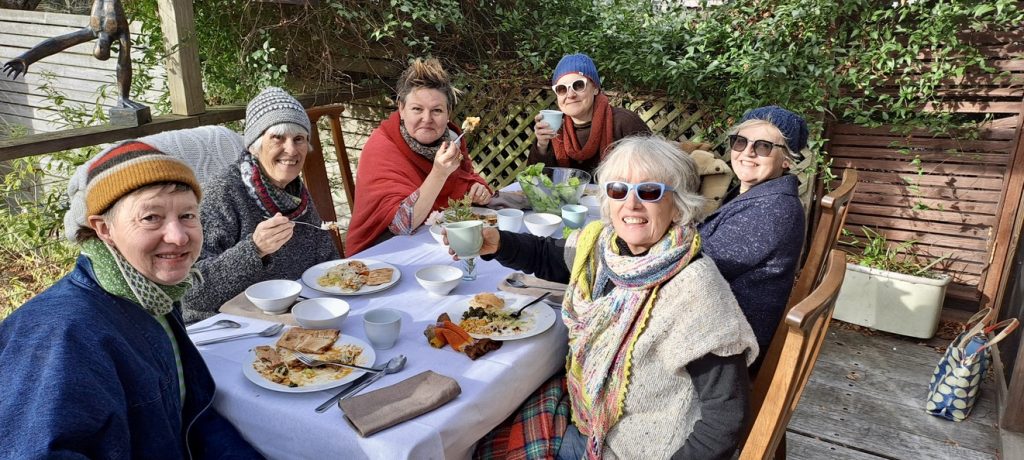
Guests enjoying the feast. (Hamish Dunlop)
Detention in Indonesia
After the Taliban had been to his home, his mother begged him not to return. He fled to Pakistan and got smuggled into Jakarta where he managed to get refugee status. This started a four-and-half-year ordeal in detention. He spent the first two months in a 2×2 meter cell with nine other men. There were two buckets. One for the toilet and one with water. Esmat says this was his university. “I said to myself, ‘This is the real life.’ People from different countries all together. I forgot myself. I could only see other people and their suffering. Diseases and uncertain situations. Every single day I saw everything.”
Esmat wrote letters to immigration and the United Nations High Commissioner for Refugees on behalf of the other detainees. Speaking six languages, he was often called on to translate. He did so without hesitation. But after being exposed to so much pain and suffering, he attempted to take his own life. It was a shock to the community. People rallied around him, bringing love and concern to his bedside. A young girl he had been translating for wept when she came to visit. He told the girl, “These days will end – things are not forever. Things will change.”
The Blue Mountains & Bower Cottage
After four and a half years in detention, Esmat arrived in Australia. Today he’s a citizen. He met Anna through their mutual support of a young Afghan woman. The woman came to Anna through Blue Mountains Refugee Support Group. Anna would go to Sydney two or three times a week to assist with legal and social support services, bringing Esmat as the translator. Through this process, they have become fast friends. Anna has helped connect Esmat with the Blue Mountains community and the lunches continue to deepen these relationships.
I visited Anna a few days before the lunch. One of the themes of our conversation was unorthodox families. Over the years, Anna’s home has been home to many, including refugees. It was constantly filled with teenagers when her boys were at school. People have also come from around the world, mainly through CouchSurfing and HelpX. Anna calls it traveling while standing still. “You don’t have to be with people for a long time to connect with them. You can go together to a gallery opening, or out for meal. These simple things can impact everyone’s lives.”

George looking after the modern fire bellows. (Hamish Dunlop)
Anna and Esmat both believe that kindness is essential for individual and community resilience. Esmat says that before his time in detention, he used to judge others. But after seeing the universality of suffering and hope, he now chooses humanity over religion. He believes too that seeing other people’s difficulties creates contrast. That darkness can reveal possibilities for human flourishing.
Anna thinks that “making family with a broader range of people is simply a better thing to do”. This generosity has built an amazing community within which she is much loved. She says people with different skills and perspectives are stronger together: “We have so much to learn from others. Especially those who come from different environments and cultures.”
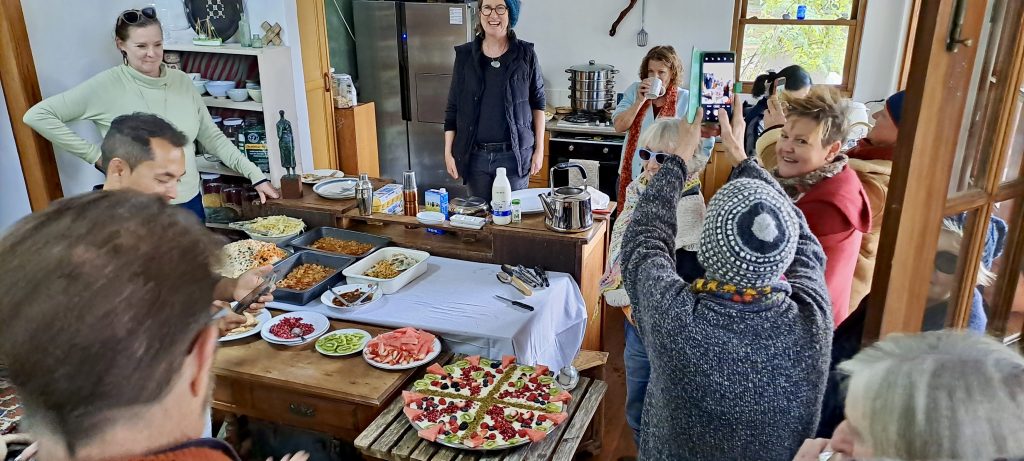
Anna and Esmat introducing dessert and thanking everyone for coming. Firni centre, bottom. (Hamish Dunlop)
Life in Australia
The freedom to be himself is what Esmat is most grateful for in Australia. He says, “People can love me, like me for me. I don’t have to hide myself.” He says he has so many things to be grateful for. “I can drink coffee. I’ve got my mum. I’m free to work. If I was to write it down, there would be 1000 things.”
He tells me when he lived in the Blue Mountains, he would drive to Sydney every day: “I worked as a brickie on scaffolding in unsafe conditions. In summer it was 30 to 40 degrees. People used to ask me, ‘How can you do this and travel in the traffic every day?’ But I never thought about the traffic. I thought about how amazing it was to see all the beautiful trees every day. To see how beautiful nature is.”
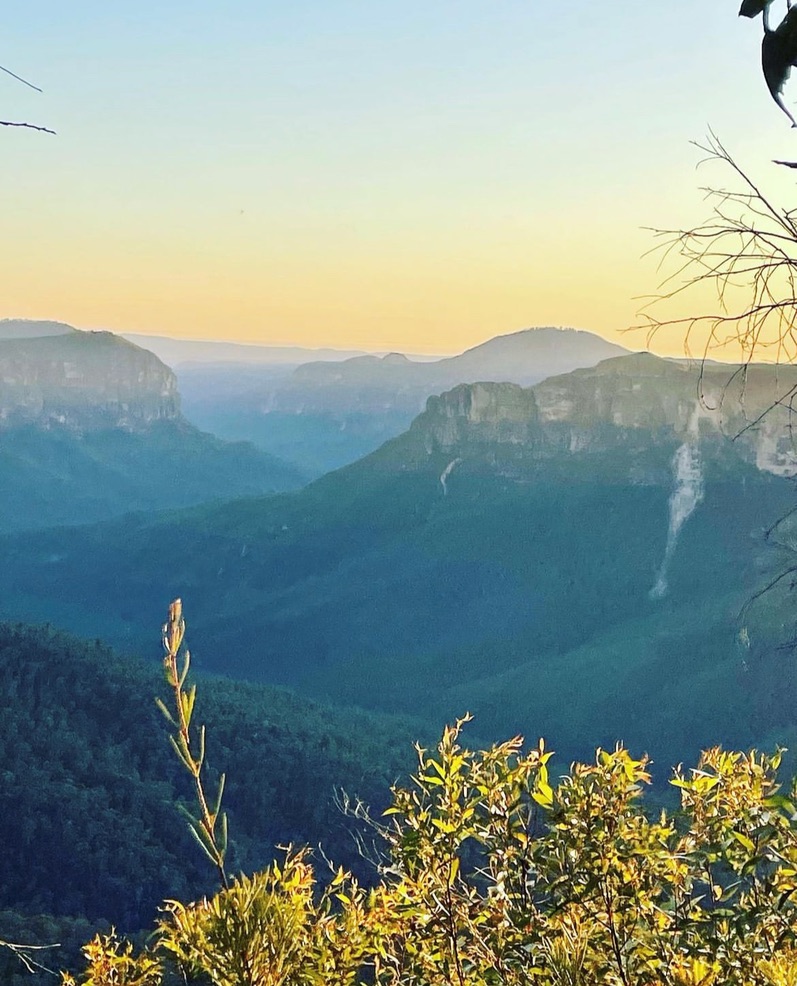
The beauty of the Blue Mountains. (Anna Ingham)
Esmat is currently working as a car transporter. He moves cars from the dock to dealerships with a truck he bought. It’s hard work as a contractor. His mum is isolated without him because she can’t freely walk. In Kabul he studied law. He’d like to get back to it: “Because my university study isn’t recognised, I’ll have to study legal services to start. Hopefully I can get work quickly. Then I can study law. I’ll be able to get back to working in the community and spending more time with my mum.”
The last dance
The music of the Wollongong players has been a wonderful accompaniment to the lunch. People have sung together and stamped their feet. The musicians are a perfect example of Anna’s concept of unorthodox families. She’d run into them the night before at a party and asked if they’d come along to a charity event. The opportunity to share delicious food and ply their craft was an easy decision to make.

The Wollongong players (Rheinberger & Wilson), with Julie Paterson and Josephine Doyle accompanying with spoons. (Hamish Dunlop)
Their last number is a cracker. The accordion pumps and the guitar plays the familiar tune made famous to me by Mary Hopkin, Those Were the Days my Friends.
We thought they’d never end
We’d sing and dance forever and a day
We’d live the life we choose
We’d fight and never lose
Esmat doesn’t recognise this version of the song, but he knows the melody intimately. His face is flush with unexpected recognition of familiar music. “This song is exactly the same! I love this song!” He tells me it’s by Ahmad Zahir. “This guys songs are the greatest songs. Even after 40 years.”

Ahmad Zahir Album cover.
He translates the words. They’re different, but similarly about love and sharing life with people. It’s a poignant moment where music and memories dissolve the bindings between time and geography. Esmat looks at me keenly. “Everything is connected,” he says. “Everything for me ends in love.”
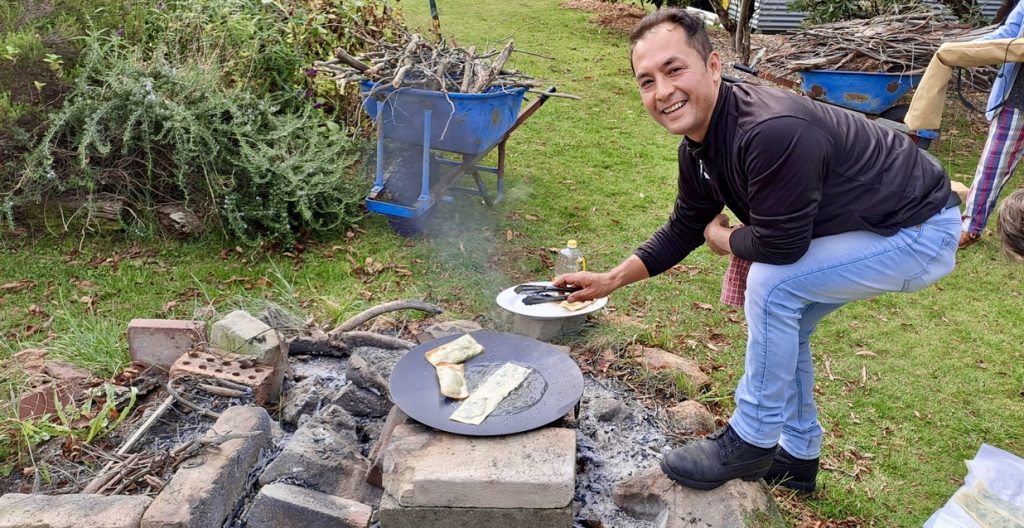
Esmat cooking baloni in the garden. (Hamish Dunlop)
If you would like to become involved in projects that support refugees in the Blue Mountains, you can find out more at Blue Mountains Refugee Support Group – BMRSG.
If this story has raised any issues for you, you can access support from the following services:
Lifeline: 13 11 14 | Text 0477 13 11 14 | lifeline.org.au
Support specific to culturally and linguistically diverse needs: embracementalhealth.org.au
Suicide callback service: 1300 659 467 | suicidecallbackservice.org.au
StandBy Support After Suicide: 1300 727 247 | standbysupport.com.au
Beyond Blue: 1300 224 636 | beyondblue.org.au/forums
MensLine Australia: 1300 789 978 | mensline.org.au
Butterfly Foundation: 1800 334 673 | butterfly.org.au
This story has been produced as part of a Bioregional Collaboration for Planetary Health and is supported by the Disaster Risk Reduction Fund (DRRF). The DRRF is jointly funded by the Australian and New South Wales governments.
